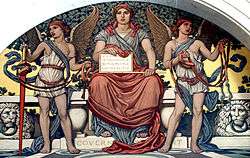Government budget
| Public finance |
|---|
 |
|
Reform |
A government budget is an annual financial statement presenting the government's proposed revenues and spending for a financial year that is often passed by the legislature, approved by the chief executive or president and presented by the Finance Minister to the nation. The budget is also known as the Annual Financial Statement of the country. This document estimates the anticipated government revenues and government expenditures for the ensuing (current) financial year.[1] For example, only certain types of revenue may be imposed and collected. Property tax is frequently the basis for municipal and county revenues, while sales tax and/or income tax are the basis for state revenues, and income tax and corporate tax are the basis for national revenues.
History

The practice of presenting budgets and fiscal policy to parliament was initiated by Sir Robert Walpole in his position as Chancellor of the Exchequer, in an attempt to restore the confidence of the public after the chaos unleashed by the collapse of the South Sea Bubble in 1720.[2]
Thirteen years later, Walpole announced his fiscal plans to bring in an excise tax on the consumption of a variety of goods and services josh, such as wine and tobacco, and to lessen the taxation burden on the landed gentry. This provoked a wave of public outrage, including fierce denunciations from the Whig peer William Pulteney, who wrote a pamphlet entitled The budget opened, Or an answer to a pamphlet. Concerning the duties on wine and tobacco - the first time the word 'budget' was used in connection with the government's fiscal policies. The scheme was eventually rescinded.[3]
The institution of the annual account of the budget evolved into practice during the first half of the 18th century and had become well established by the 1760s; George Grenville introduced the Stamp Act in his 1764 budget speech to the House of Commons of Great Britain. [4]
Types
Government budgets are of the following types:
- Union Budget : The union budget is the budget prepared by the central government for the country as a whole.
- State Budget : In countries like India, there is a federal system of government thus every state prepares its own budget.
- Plan Budget: It is a document showing the budgetary provisions for important projects, programmes and schemes included in the central plan of the country. It also shows the central assistance to states and union territories.
- Performance Budget: The central ministries and departments dealing with development activities prepare performance budgets, which are circulated to members of parliament. These performance budgets present the main projects,programmes and activities of he government in the light of specific objectives and previous years' budgets and achievements.
- Supplementary Budget: This budget forecasts the budget of the coming year with regards revenue and expenditure.
- Zero-Based Budget: This is defined as the budgetary process which requires each ministry/department to justify its entire budget in detail. It is a system of budget in which all government expenditures must be justified for each new period.
Elements
The two basic elements of any budget are the revenues and expenses. In the case of the government, revenues are derived primarily from taxes. Government expenses include spending on current goods and services, which economists call government consumption; government investment expenditures such as infrastructure investment or research expenditure; and transfer payments like unemployment or retirement benefits.
Special consideration
Government budgets have economic, political and technical basis. Unlike a pure economic budget, they are not entirely designed to allocate scarce resources for the best economic use. They also have a political basis wherein different interests push and pull in an attempt to obtain benefits and avoid burdens. The technical element is the forecast of the likely levels of revenues and expenses.
Classification
A budget can be of 3 types:
- Balanced Budget: When government receipts are equal to the government expenditure, it is called a balanced budget.
- Deficit Budget: When government expenditure exceeds government receipts, the budget is said to be deficit. A deficit can be of 3 types, Revenue, Fiscal and Primary deficit.
- Surplus: When government receipts are more than expenditure.
A budget can be classified in 3 categories which are;
- according to Function
- according to Flexibility
- according to Time
by affolitious Solusi
Need and Importance of a Government Budget
Government Budget is a subject of immense importance for a variety of reasons
- Planned approach to Government's activities
- Integrated Approach to fiscal operations
- Affecting economic Activities
- Instrument of Economics policy
- Index of Government's functioning
- Public Accountability
- Allocation of Resources
References
- ↑ Public Budgeting and Financial Management, Florida International University, Retrieved November 21, 2013
- ↑ "History, Origins and Traditions of the Budget". Archived from the original on 2012-01-17. Retrieved 2012-12-17.
- ↑ "A history of the Budget". Retrieved 2012-12-17.
- ↑ "The first budget? Walpole’s bag of tricks and the origins of the chancellor’s great secret". Retrieved 2012-12-17.
- Professor L. Randall Wray:Why The Federal Budget Is Not Like a Household Budget
- Budget Deficits and Net Private Saving
- Sectoral Balances in State Budget. By Fred Bethune
- Performance Budgeting: Linking Funding and Results, Marc Robinson (ed.), IMF, 2007
- Fiscal Policy in a Stock-Flow Consistent Model by Wynne Godley and Marc Lavoie
- From Line-item to Program Budgeting, John Kim, Seoul, 2007
Further reading
- Higgs, Robert (2008). "Government Growth". In David R. Henderson (ed.). Concise Encyclopedia of Economics (2nd ed.). Indianapolis: Library of Economics and Liberty. ISBN 978-0865976658. OCLC 237794267.
- Seater, John J. (2008). "Government Debt and Deficits". In David R. Henderson (ed.). Concise Encyclopedia of Economics (2nd ed.). Indianapolis: Library of Economics and Liberty. ISBN 978-0865976658. OCLC 237794267.
External links
- List of countries by budget; its reference is the CIA's World factbook, in alphabetic order.